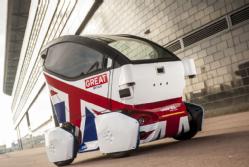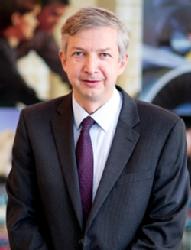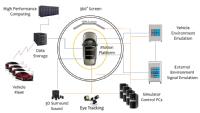WMG News - Latest news from WMG
Let’s talk automotive advances
 Our Professor of Experiential Engineering Paul Jennings, will be presenting “The road to autonomous connected vehicles” at the Malvern Festival of Innovation next Wednesday (4 October).
Our Professor of Experiential Engineering Paul Jennings, will be presenting “The road to autonomous connected vehicles” at the Malvern Festival of Innovation next Wednesday (4 October).
The Festival, which runs from 2-6 October, takes place at the Morgan Motor Company, and will explore topics including how research and development is leading to new technologies to improve lives, and the new insights that are leading the way.
Professor Jennings’s talk will form part of the Automotive Advances programme, and will focus on self-parking and autonomous driving capabilities, and the next significant advances including how our roads might look in the future.
For more information on the Festival and the full Automotive Advances line-up visit: https://www.festival-innovation.com/
WMG Professor recognised at prestigious European automotive awards
 WMG’s Professor Paul Jennings, and his Experiential Engineering research team, have received a ‘Highly Commended’ accolade at the prestigious AutoSens Awards.
WMG’s Professor Paul Jennings, and his Experiential Engineering research team, have received a ‘Highly Commended’ accolade at the prestigious AutoSens Awards.
The automotive awards held in Brussels, recognise the greatest design, technical and marketing innovations within the automotive imaging sector.
Professor Jennings and his team were recognised as ‘Highly Commended’ in the Greatest Exploration category, for their inventive 3xD driving simulator, a key facility for our researchers working on Autonomous, Smart and Connected Vehicles.
WMG Professor shortlisted for prestigious education award
 WMG’s Professor Paul Jennings has been shortlisted in the ‘Outstanding Research Supervisor of the Year’ category at the prestigious Times Higher Education Awards 2016.
WMG’s Professor Paul Jennings has been shortlisted in the ‘Outstanding Research Supervisor of the Year’ category at the prestigious Times Higher Education Awards 2016.
Professor Jennings leads WMG’s Energy and Electrical Systems and Intelligent Vehicles research.
He is undoubtedly one of WMG’s most experienced doctoral supervisors, noted for his academic rigour, quiet efficiency and capacity for hard work, as well as his loyalty to colleagues and dedicated supervision of his students. It comes as no surprise that Paul’s approach has won the highest respect and admiration from colleagues, students, and industrial collaborators.
New Associate Professor joins Connected and Autonomous Vehicles research
 WMG
WMG , University of Warwick is pleased to announce the appointment of Dr Matthew Higgins
, University of Warwick is pleased to announce the appointment of Dr Matthew Higgins as an Associate Professor, in the area of Connected and Autonomous Vehicles
as an Associate Professor, in the area of Connected and Autonomous Vehicles research.
research.
Dr Higgins has spent the last seven years, working in association with some of the UK’s leading defence and telecommunications companies.
He progressed through a number of roles including Research Assistant, Research Fellow, and Senior Teaching Fellow, before being promoted in 2012 to the position of Assistant Professor. His research focused primarily on Optical, Nano, and Molecular Communications. Whilst in this position, Dr Higgins set up the Vehicular Communications Research Laboratory, which aimed to enhance the use of communications systems within the vehicular space.
WMG tests driverless pods with laser scan of Coventry roads as part of Intelligent Transport Initiative

WMG at the University of Warwick is to use a laser scan of 30 miles of Coventry roads to test driverless pods as part of a research programme launched this week.
WMG will work with RDM Group - the UK’s only designer and manufacturer of driverless Pods - in a project called INnovative Testing of Autonomous Control Techniques (INTACT).
The project, funded by Innovate UK, will enable Coventry based automotive innovation experts RDM to test its vehicles on one of the world’s most adaptable and advanced driving simulators at WMG.
Expert Comment: Professor Paul Jennings
 Professor of Experiential Engineering, Paul Jennings comments on US plans $4bn for self-driving rules.
Professor of Experiential Engineering, Paul Jennings comments on US plans $4bn for self-driving rules.
Self-driving, or autonomous, vehicle technology is developing at a rapid rate. Many of the world’s largest vehicle manufacturers are already unveiling self-driving car solutions and are being joined in the race by new players such as Google, Tesla and UK initiatives such as those by RDM Automotive LTD.
The need for a consistent set of regulations and international testing standards, as identified by the $4bn US DoT initiative for common rules, is critical in bringing self-driving cars to our roads. We know for example that current rules require the use of trained drivers for testing, but we have to consider how to engage end-users early on in the testing of self-driving vehicles. I believe these factors are key to increasing public acceptance and trust in autonomous driving technologies.
Let's Talk Driverless Technology
 Professor of Experiential Engineering, Paul Jennings is pleased to be representing WMG at the Driverless Technology Conference and Exhibition (DTCE’15) on Monday (23 November) in London.
Professor of Experiential Engineering, Paul Jennings is pleased to be representing WMG at the Driverless Technology Conference and Exhibition (DTCE’15) on Monday (23 November) in London.
DTCE’15 will welcome around 300 delegates from across the entire driverless supply chain, and experts will explore the key issues in a mix of live demonstrations, seminars and workshops.
Professor Jennings will present ‘A Driver-in-the-Loop Simulator for Connected and Autonomous Vehicles’ in a special technical workshop alongside colleagues from Cranfield University, University of Coventry and the University of Leeds.
£4.2 million for world’s most adaptable driving simulator to research driverless cars
 WMG at the University of Warwick have been awarded £3.2 million by The Engineering and Physical Sciences Research Council (EPSRC) to create one of the world’s most adaptable and advanced driving simulators. Support from industry including a further £1 million of funding has been gained to begin research projects with the new technology led by research students embedded in JLR, bringing the total cost of the simulator and its research programme to £4.2 million.
WMG at the University of Warwick have been awarded £3.2 million by The Engineering and Physical Sciences Research Council (EPSRC) to create one of the world’s most adaptable and advanced driving simulators. Support from industry including a further £1 million of funding has been gained to begin research projects with the new technology led by research students embedded in JLR, bringing the total cost of the simulator and its research programme to £4.2 million.
In its first phase the simulator will be tested and piloted in WMG’s International Manufacturing Centre before moving to its final home in the National Automotive Innovation Centre (NAIC).
The simulator, which will be available to a range of research groups, will use a LIDAR scan (a high resolution laser scan of a real driving environment) of 30 miles of real roads around the City of Coventry to test vehicles in the simulator. While the simulator will use a fixed test car for many tests it will also be configured so that any make of car can be driven into the simulator for testing which is believed to be a unique capability for such an advanced simulator.
Should electric cars be made to go 'vroom'?
With whisper-quiet electric cars set to proliferate, the motor industry is under pressure to give them an artificial noise for safety purposes, but should they sound like traditional petrol vehicles? BBC News Magazine discuss the issue with WMG's Professor Paul Jennings.
Researchers help make silent electric vehicles safer but UFO reports could rise…
A little green van called ELVIN is whizzing around the University of Warwick as part of a major research project aimed at tackling the safety issues linked to the lack of sound from electric vehicles. However ELVIN (Electric Vehicle with Interactive Noise) faces a risk of being perceived as a little green man rather than as a little green van.
project aimed at tackling the safety issues linked to the lack of sound from electric vehicles. However ELVIN (Electric Vehicle with Interactive Noise) faces a risk of being perceived as a little green man rather than as a little green van.
ELVIN will be able to emit many different sounds aimed at alerting pedestrians and other road users that he is nearby. One of the range of sounds being tested is said to invoke memories of early science fiction movies and the researchers will have to be sure it really does alert pedestrians and other road users to oncoming electric vehicles rather than causing them to look skyward for more unearthly vehicles.
